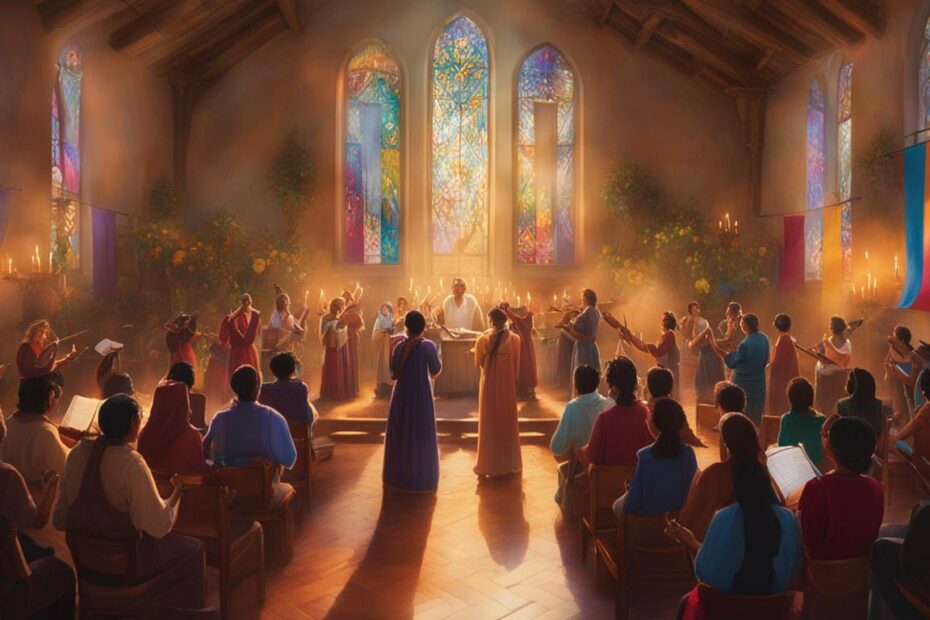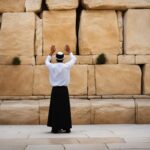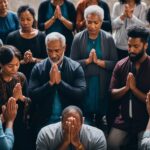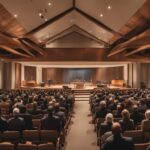In this comprehensive guide, we will delve into the beauty of worship and uncover its depth, traditions, and the transformative journey it offers for spiritual enrichment. From worship services to worship songs and music, we will explore the various aspects of worship and its significance in different religious traditions. Get ready to discover the power and meaning behind this sacred practice.
Key Takeaways:
- Worship plays a central role in religious practices across various faiths, providing a way for believers to connect with the divine.
- Worship services, led by worship leaders, create a communal experience of praise and spiritual connection.
- Worship songs and music serve as a powerful medium for spiritual expression, inspiring and uplifting worshippers.
- Creating a meaningful worship experience requires careful planning and guidance from worship leaders.
- Rituals and traditions add depth and symbolism to worship, fostering a sense of continuity and connection in religious communities.
The Importance of Worship in Religious Practices
Worship plays a central role in religious practices across various faiths. It is a way for believers to connect with the divine and express their devotion. In churches, worship services led by worship leaders provide a communal experience of praising and seeking spiritual connection. The worship experience often includes elements such as prayers, hymns, sermons, and rituals, creating a sacred space for believers to come together and engage in acts of reverence and reflection.
The Role of Worship Leaders
Worship leaders hold a significant position within the worship experience. They guide and inspire the congregation, leading them in songs of worship and facilitating moments of prayer and reflection. With their deep understanding of religious traditions and their ability to create a meaningful atmosphere, worship leaders play a crucial role in enhancing the worship experience.
Through their knowledge of sacred texts and teachings, worship leaders provide guidance and impart spiritual wisdom to the worshippers. They lead congregations in uplifting worship songs, encouraging participation and fostering a sense of unity and community. Worship leaders also have the responsibility of ensuring that the worship service aligns with the values and teachings of the faith, creating a space where worshippers can connect with the divine in a meaningful way.
The Transformative Power of Worship
Worship is not just about going through the motions; it is a transformative journey that has the potential to touch the depths of our souls and lead us to a greater understanding of ourselves and the divine.
When worshippers engage in acts of devotion and enter into a state of worship, they open themselves up to experiencing a profound spiritual transformation. Through prayer, music, and reflection, worship allows individuals to express their deepest emotions and connect with something greater than themselves. It is a sacred space where believers can find solace, inspiration, and a sense of purpose.
Worship has the ability to uplift spirits, provide comfort in times of hardship, and ignite a deep sense of gratitude and reverence. It can serve as a catalyst for personal growth and spiritual enlightenment. By participating in worship services and actively engaging in the worship experience, individuals can cultivate a deeper connection with their faith and find meaning and fulfillment in their spiritual journey.
Table: Comparison of Worship Practices
| Religion | Worship Service Format | Worship Leader Role |
|---|---|---|
| Christianity | Church service with prayers, hymns, sermons, and sacraments | Pastor or priest leading the congregation in worship |
| Islam | Five daily prayers, Friday congregational prayer in the mosque | Imam leading the prayers and delivering sermons |
| Hinduism | Puja ceremonies with offerings, chants, and prayers | Priest or religious leader conducting the rituals |
| Buddhism | Meditation sessions, chanting, and recitation of Buddhist scriptures | Monks or nuns leading the meditation and chanting |
As seen in the table, worship practices vary across different religions, highlighting the unique ways in which believers connect with their faith. Whether it is through prayers, hymns, sacraments, or meditation, the goal of worship remains the same – to honor and seek a deeper connection with the divine.
In conclusion, worship holds immense importance in religious practices. It provides a means for believers to express their devotion, seek spiritual connection, and experience a transformative journey. With the guidance of worship leaders and the participation of the congregation, worship services create a sacred space for believers to come together and engage in acts of reverence and reflection. Through worship, individuals can find solace, inspiration, and a deeper understanding of their faith, fostering personal growth and enriching their spiritual lives.
The Power of Worship Songs and Music
Worship songs and music have the remarkable ability to transcend barriers and touch the depths of the human soul. From ancient hymns to contemporary melodies, the power of worship music lies in its ability to create an atmosphere of reverence and spiritual connection. Whether it’s the uplifting chorus of a gospel hymn or the gentle melody of a worship ballad, these songs have the capacity to move hearts and inspire worshippers.
When worshippers gather together and lift their voices in song, the worship experience is elevated to new heights. The harmonious blend of voices, accompanied by a worship band, creates a sense of unity and collective praise. The words and melodies of worship songs often speak directly to the heart, conveying messages of faith, hope, and devotion. As worshippers engage in these musical expressions of worship, they find solace and inspiration, experiencing a deep connection with the divine.
The Role of Worship Lyrics
The lyrics of worship songs play a crucial role in guiding and engaging believers in their spiritual journey. These carefully crafted words are designed to resonate with the worshipper, evoking emotions and deepening their connection to the divine. Through poetic imagery and powerful declarations of faith, worship lyrics capture the essence of the worship experience. They express the longing for spiritual fulfillment and the joy of praising something greater than ourselves.
“Worship lyrics have the power to evoke a range of emotions and bring worshippers into a transformative encounter with the divine.”
Worship lyrics often draw from sacred texts and scripture, reinforcing the teachings and values of a religious tradition. They serve as a reminder of the timeless wisdom and the truths that believers hold dear. Whether they are sung in traditional hymns or contemporary praise songs, worship lyrics have the ability to guide worshippers on a spiritual journey and anchor their faith.
The Transformative Experience
Engaging in worship through music is a transformative experience that goes beyond mere entertainment. It opens the door to a sacred space where believers can encounter the divine and experience personal growth. Worship songs and music provide a channel for the expression of deep emotions, allowing worshippers to pour out their hearts and connect with something greater than themselves.
Through the power of worship songs and music, worshippers can find solace in times of adversity, draw strength for their daily challenges, and experience a sense of belonging within their faith community. The transformative impact of worship goes beyond the boundaries of the physical space, leaving a lasting impression on the hearts and minds of believers long after the music fades.
The Power of Worship Songs and Music: A Table of Insights
| Insight | Description |
|---|---|
| Emotional Connection | Worship songs and music have the power to evoke strong emotions and create a deep connection with the divine. |
| Communal Experience | When worshippers come together in singing, the experience is elevated and fosters a sense of unity and collective praise. |
| Spiritual Guiding | Worship lyrics guide believers on their spiritual journey, reinforcing teachings and deepening their connection to the divine. |
| Transformative Impact | Engaging in worship through music can lead to personal growth, solace, and a sense of belonging within a faith community. |
Nurturing a Meaningful Worship Experience
In order to create a meaningful worship experience, careful planning and guidance from worship leaders are essential. Worship services are designed to facilitate spiritual growth and foster a deep connection with the divine. Through a structured format that includes elements such as prayer, singing, and listening to sermons, worshippers are able to engage in acts of devotion and reflection.
Worship leaders play a crucial role in guiding the congregation and creating a sacred atmosphere that encourages active participation and introspection. They lead by example, embodying the spirit of worship and inspiring others to do the same. With their guidance, worshippers are able to fully immerse themselves in the worship experience, allowing for a profound encounter with the divine.
It is important for worship services to strike a balance between structure and spontaneity. While a structured format provides a framework for worshippers to engage in acts of worship, there should also be room for the leading of the Holy Spirit. This allows for moments of spontaneity and personal connection with the divine, providing a unique and individualized worship experience for each participant.
“True worship is not about following a script or going through the motions. It is about surrendering oneself to the presence of God and aligning one’s heart with His will,” says Pastor John Smith, a renowned worship leader and author.
By nurturing a meaningful worship experience, worshippers are able to deepen their faith, find solace in times of difficulty, and experience the transformative power of worship. It is through these experiences that individuals are able to connect with something greater than themselves and find purpose and inspiration in their faith.
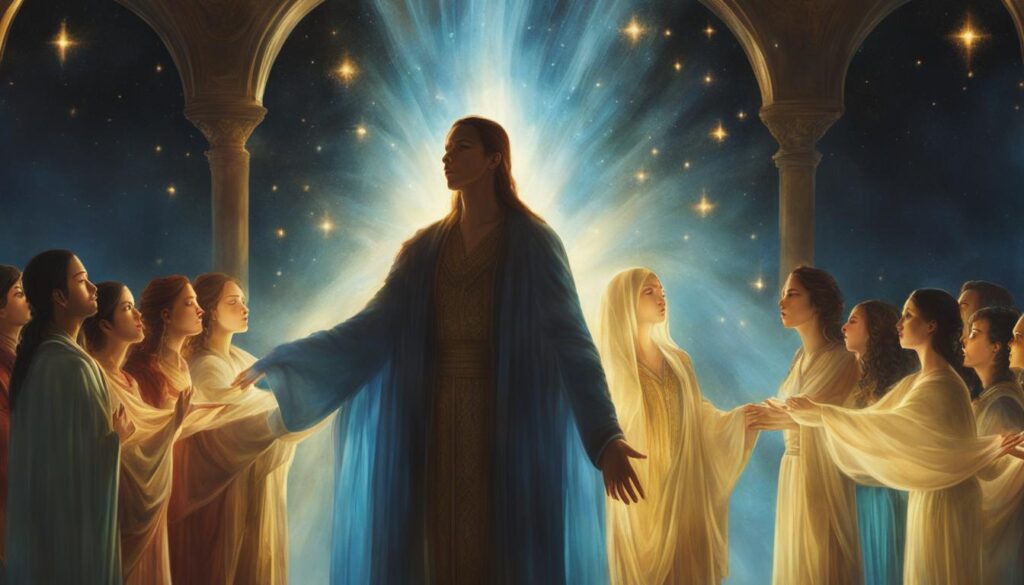
Key Elements of a Meaningful Worship Experience
- Spiritual Guidance: Worship leaders provide guidance and direction, helping worshippers navigate their spiritual journey.
- Community Participation: Worship services create a sense of community and allow for collective worship and communal prayer.
- Personal Reflection: Worship services provide opportunities for introspection and self-reflection, allowing individuals to connect with the divine on a personal level.
- Spiritual Growth: Engaging in regular worship services fosters spiritual growth and deepens one’s connection with their faith.
Table: Worship Services vs. Personal Worship
| Worship Services | Personal Worship | |
|---|---|---|
| Community | Worshiping with others | Worshiping alone |
| Structure | Follows a structured format | Flexible and personalized |
| Guidance | Led by worship leaders | Self-guided |
| Communion | Partakes in communal acts of worship | Direct connection with the divine |
| Spiritual growth | Fosters spiritual growth in a community setting | Encourages personal spiritual growth |
Enhancing Worship with Rituals and Traditions
In religious worship, rituals and traditions hold a significant role in creating a meaningful and transformative experience. These practices add depth, symbolism, and a sense of continuity to worship services, connecting worshippers with their faith’s history and teachings. By engaging in rituals and upholding traditions, believers actively participate in acts of devotion and establish a stronger connection with the divine.
Rituals encompass a wide range of practices, including the use of specific symbols, gestures, and actions that carry profound meaning within a religious context. For example, lighting candles can symbolize the presence of light in the darkness, while the act of kneeling expresses humility and reverence. These physical manifestations of faith enhance the worship experience, allowing individuals to engage their senses and create a sacred atmosphere.
Traditions, on the other hand, are deeply rooted customs that are passed down through generations. They serve as a way to honor and preserve the teachings and values of a religious community. Examples of traditions include the observance of religious holidays, the recitation of prayers in a specific language, or the wearing of particular attire during worship. These traditions unite worshippers and foster a sense of belonging and identity within their faith.
| Rituals | Traditions |
|---|---|
| Use of specific symbols and gestures | Observance of religious holidays |
| Action-oriented practices | Recitation of prayers in a specific language |
| Physical manifestations of faith | Wearing of particular attire during worship |
| Enhance the worship experience | Promote a sense of belonging and identity |
Quotes:
“Rituals and traditions bring a sense of sacredness and continuity to worship, connecting us with something greater than ourselves.” – Reverend Sarah Thompson
“Engaging in rituals and upholding traditions in worship allows us to honor our past, celebrate our present, and solidify our foundation for the future.” – Rabbi David Cohen
By participating in rituals and upholding traditions, worshippers not only deepen their spiritual connection but also foster a sense of community and shared identity. These practices remind individuals of their place within a religious tradition and provide a framework for expressing devotion. Whether it’s a simple ritual or a longstanding tradition, each element contributes to the richness and depth of the worship experience.

Conclusion
Worship is a spiritual practice that holds immense significance in religious communities worldwide. It serves as a means of expressing devotion, seeking divine connection, and fostering spiritual growth. Through worship services, worship songs, and the guidance of worship leaders, believers can experience a profound encounter with the divine.
By understanding the power and depth of worship, individuals can embark on a journey of spiritual enrichment and find solace and inspiration in their faith. Whether you participate in traditional worship services or engage in more contemporary forms of worship, the essence remains the same – to honor and connect with something greater than ourselves.
Religious worship encompasses a wide range of rituals and traditions, each adding depth and symbolism to the worship experience. These practices serve as a means of upholding the customs of our religious communities and fostering a sense of connection to our faith’s history and teachings.
As we explore the world of worship, we are invited to engage in acts of devotion, prayer, and reflection, allowing us to nurture our spiritual growth and deepen our connection with the divine. May this journey into the realms of worship bring you closer to the heart of your faith, and may you find solace, inspiration, and a deeper sense of purpose along the way.
FAQ
What is the purpose of worship?
Worship serves as a means of expressing devotion, seeking divine connection, and fostering spiritual growth.
What are worship services?
Worship services are communal experiences led by worship leaders that provide a structured format for believers to engage in acts of devotion, such as prayer, singing, and listening to sermons.
How do worship songs and music enhance the worship experience?
Worship songs and music serve as a medium for spiritual expression, conveying deep emotions and messages of faith. They uplift and inspire worshippers, creating an atmosphere of praise and adoration.
What role do worship leaders play in the worship experience?
Worship leaders play a crucial role in guiding the congregation and creating a sacred atmosphere that encourages participation and reflection.
What are the rituals and traditions associated with worship?
Rituals and traditions add depth and symbolism to the worship experience, providing a sense of continuity and connection to the faith’s history and teachings. They involve the use of specific symbols, gestures, and observance of sacred rituals.
How can worship enrich one’s spiritual journey?
Through worship, individuals can experience a profound encounter with the divine, find solace and inspiration in their faith, and embark on a journey of spiritual enrichment.


